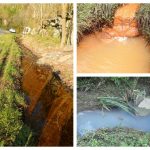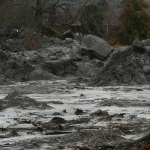Posts Tagged ‘Health’
To tell the truth

Last month, our director of programs, Matt Wasson, testified before Congress about the perils of mountaintop removal and coal ash pollution, and the failure of some state agencies to protect communities from pollution. While Matt had a rare opportunity to provide a reality check for elected leaders, it’s the people in coal-impacted communities who know this reality better than anyone.
Mountaintop removal is the 800-pound gorilla at the SOAR Health Impact Series
 Mountaintop removal’s health impacts were the number one concern of eastern Kentuckians that participated in the SOAR Health Impact Series, but the topic was barely addressed at a recent SOAR gathering in Hazard. If they hope to soar beyond political rhetoric, Rep. Hal Rogers and Gov. Steve Beshear must take those concerns seriously, and support more research into the connections between mountaintop removal and health.
Mountaintop removal’s health impacts were the number one concern of eastern Kentuckians that participated in the SOAR Health Impact Series, but the topic was barely addressed at a recent SOAR gathering in Hazard. If they hope to soar beyond political rhetoric, Rep. Hal Rogers and Gov. Steve Beshear must take those concerns seriously, and support more research into the connections between mountaintop removal and health.
An activist is born
 An Appalachian Voices intern attends her first-ever environmental rally and finds a sense of belonging among other advocates calling for clean energy and climate action. “It’s one thing to wear the pins and stickers; it’s another thing to feel empowered by your peers to take action and work towards a common goal,” Marissa Wheeler writes.
An Appalachian Voices intern attends her first-ever environmental rally and finds a sense of belonging among other advocates calling for clean energy and climate action. “It’s one thing to wear the pins and stickers; it’s another thing to feel empowered by your peers to take action and work towards a common goal,” Marissa Wheeler writes.
One fish, two fish … Dead fish
 A study from researchers at the U.S. Geological Survey (USGS) published this month provides strong new evidence that mountaintop removal coal mining in Appalachia is devastating downstream fish populations.
A study from researchers at the U.S. Geological Survey (USGS) published this month provides strong new evidence that mountaintop removal coal mining in Appalachia is devastating downstream fish populations.
Fortunately, the Obama administration has an opportunity to take meaningful action to protect Appalachian streams.
North Carolina “off the sidelines” to fast-track fracking
 Four months after a massive coal ash spill devastated the Dan River, and before the state’s coal ash problem is remedied, North Carolina is poised to open a new can of worms. On Wednesday, Gov. Pat McCrory signed the Energy Modernization Act, lifting a moratorium on natural gas drilling in the state.
Four months after a massive coal ash spill devastated the Dan River, and before the state’s coal ash problem is remedied, North Carolina is poised to open a new can of worms. On Wednesday, Gov. Pat McCrory signed the Energy Modernization Act, lifting a moratorium on natural gas drilling in the state.
N.C. coal plant neighbors ask: “At what cost?”
 Near the beginning of our new video, Stokes County, N.C., resident Annie Brown says, “I love to turn the switch on and have my lights just like anyone else, but at what cost?” It’s a question we should all ask of ourselves. But we also must direct our elected officials and electric providers to consider the question: at what cost do our outdated energy policies and practices come?
Near the beginning of our new video, Stokes County, N.C., resident Annie Brown says, “I love to turn the switch on and have my lights just like anyone else, but at what cost?” It’s a question we should all ask of ourselves. But we also must direct our elected officials and electric providers to consider the question: at what cost do our outdated energy policies and practices come?
Study Confirms Air Pollution from Mountaintop Removal

For generations, coal-mining communities in Appalachia have raised questions about local health problems, wondering whether or not they may be linked to pollution from nearby coal mines. A recent study conducted by a group of West Virginia University researchers has confirmed that suspicion, reporting that potentially dangerous air pollution levels are more likely in areas surrounding mountaintop removal coal mines than in mine-free communities.
A Watched EPA Never Acts: 5 Years After the TVA Coal Ash Disaster
It has been five years since the TVA Coal Ash disaster in Tennessee, which sent 1.1 billion gallons of toxic coal ash into Emory and Clinch rivers. While the nation has watched and petitioned the U.S. Environmental Protection Agency, the agency responsible for issuing federal standards for coal ash disposal, little action has been taken. Perhaps this is similar to the old adage that says “a watched pot never boils.”
Read MorePaige Cordial: Minding Mental Health
By Rachel Ellen Simon Post-traumatic stress disorder is most commonly associated with soldiers who have seen combat, but psychologist Paige Cordial has found similar symptoms in the coalfields of Appalachia. Cordial recently received her doctorate in counseling psychology at Virginia’s Radford University, where she wrote her dissertation on the relationship between physical proximity to mountaintop…
Read MoreThe Clock is Ticking on Coal Ash: EPA Given 60 Days to Set Deadline on Regulation of Toxic Coal Waste
After years of delays and setbacks, the clock is finally ticking on the U.S. Environmental Protection Agency to propose a deadline for federal regulations of coal ash. On Tuesday, a federal judge gave the EPA 60 days to file a written submission setting forth a proposed deadline for its review and revision of regulations concerning…
Read More

